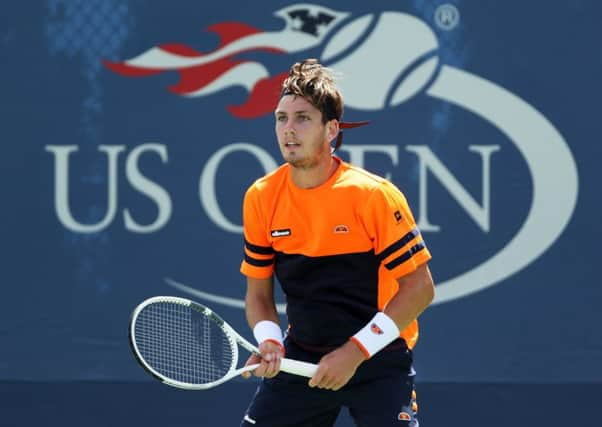Cameron Norrie ready to step into US Open spotlight


Today, Cameron Norrie will be called upon to fill the world No 2’s shoes as he attempts to beat Pablo Carreno Busta and reach the third round in Flushing Meadows.
On Monday, Norrie notched the first grand slam win of his career by beating Dmitry Tursunov; now he finds himself as the last Scot standing in the singles. He is now Murray’s understudy and seeing as the leading man is indisposed, it is his time to step into the spotlight.
Advertisement
Hide AdAdvertisement
Hide AdFortunately, Murray has already given Norrie a few tips and a bit of direction. The two met at Queen’s Club where, as Norrie’s father David explained, Murray took the 22-year-old under his wing.
“Andy came up to Cameron in the locker room at the Queen’s Club and introduced himself,” Norrie Snr said. “They hit together quite a lot before Wimbledon and the experience of playing and preparing with Andy has shown Cameron just how focused you must be to reach the top.
“Cameron was amazed at how Andy didn’t want to waste a single ball in practice. He’s a great role model.
“He comes across so well. I don’t understand those who don’t like him. Off the court he’s erudite, witty and balanced. He shows great humility as well.
“He maybe knew Cameron lacked the courage to go up and introduce himself at Queen’s, so he did it himself, which speaks volumes.”
David and his wife, Helen, are both micro-biologists. They met and married in Johannesburg but once they had started a family, they decided life was just too dangerous in South Africa so they moved to the peace and quiet of New Zealand where their young son played any and every sport he could.
Despite his international upbringing, Cameron still claims to feel “pretty Scottish”, even if he does say that his dad speaks with a “filthy Scottish accent”. Cameron, meanwhile, speaks with a confused mix of American twang (he has spent three years at university in Texas) and clipped New Zealand vowels.
“I was raised in King’s Park in Glasgow, only a couple of streets away from Hampden,” David said. “In fact, from our house I could hear the roar of the crowd when the big matches were on.
Advertisement
Hide AdAdvertisement
Hide Ad“I’m 62 and came from an era when you could get a ‘lift over’ the turnstiles. I watched quite a few games that way, but my most memorable match as a Scot was in 1967 when we defeated England at Wembley. I was only 11 but the image of Jim Baxter playing keepy-uppy lives in my memory still.”
While the family came to Wimbledon this summer, there is no chance that they will make the trip to New York. David – who played junior tennis for West of Scotland – is going to France with a group of friends to ride a couple of the Tour de France mountain stages. He was only able to follow his son’s progress in the first round on live scores and he is hoping that some local TV station screens today’s match.
New Zealand may be beautiful and a great place to bring up a family but it is very remote. Having decided at the age of 15 to follow a tennis career, young Cameron knew he had to leave to achieve his goals. The next year he moved to London and settled into the now defunct National Training Centre in Roehampton. That gave him the opportunity to train and compete but it was not the life he wanted.
“If he wanted to improve as a tennis player he had no option but to leave New Zealand,” David said. “You have to live here to understand the dearth of opportunities for tennis players. Even the guys who represent New Zealand in the sport don’t live here.
“He was probably a bit too young [when he moved to London]. He came back and thought going to college was the better option for him to fulfil his ambitions and live a more rounded life. However, being part of the LTA system helped him feel British. He feels like a British guy now.”
And British guys, particularly Scots, have been doing well of late. Cameron is ranked No 225 in the world at the moment, although he will have moved into the top 200 by the time the US Open is over. At the age of 22, he may be a bit of a late developer, but David thinks that his son has plenty to look forward to.
“I’d like to think he can get into the top 50 over the next couple of years and establish himself there,” David said. “If that happens, why not aim even higher? The average age of a player in the top 100 is 28 so he still has six years to reach his peak.
“Cameron was nervous before the match with Tursunov because it was the first time he’d made the main draw of a Slam on his own merits. Moving forward, the first round experience will stand him in good stead.”